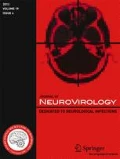Abstract
We investigated whether vitamin D is associated with HIV-associated neurocognitive disorder (HAND). HIV-infected (HIV+) antiretroviral therapy (ART)-naïve adults in rural Uganda underwent a neurocognitive battery for determination of HAND stage at baseline and after 2 years. Baseline serum 25-hydroxyvitamin D (25OH-D) and serum and cerebrospinal fluids (CSF) vitamin D-binding protein (VDBP) were obtained. Of the 399 participants, 4% (n = 16) were vitamin D deficient (25OH-D < 20 ng/mL). There was no association between 25OH-D, serum or CSF VDBP, and HAND stage at baseline or follow-up. Future studies in a population with higher levels of vitamin D deficiency may be warranted.
References
Anthony IC, Norrby KE, Dingwall T, Carnie FW, Millar T, Arango JC, Robertson R, Bell JE (2010) Predisposition to accelerated Alzheimer-related changes in the brains of human immunodeficiency virus negative opiate abusers. Brain 133:3685–3698
Antinori A, Arendt G, Becker JT, Brew BJ, Byrd DA, Cherner M, Clifford DB, Cinque P, Epstein LG, Goodkin K, Gisslen M, Grant I, Heaton RK, Joseph J, Marder K, Marra CM, McArthur JC, Nunn M, Price RW, Pulliam L, Robertson KR, Sacktor N, Valcour V, Wojna VE (2007) Updated research nosology for HIV-associated neurocognitive disorders. Neurology 69:1789–1799
Berridge MJ (2014) Calcium regulation of neural rhythms, memory and Alzheimer’s disease. J Physiol 592:281–293
Bishnoi RJ, Palmer RF, Royall DR (2015) Vitamin D binding protein as a serum biomarker of Alzheimer’s disease. J Alzheimers Dis 43:37–45
Clifford DB, Fagan AM, Holtzman DM, Morris JC, Teshome M, Shah AR, Kauwe JS (2009) CSF biomarkers of Alzheimer disease in HIV-associated neurologic disease. Neurology 73:1982–1987
Ezeamama AE, Guwatudde D, Wang M, Bagenda D, Kyeyune R, Sudfeld C, Manabe YC, Fawzi WW (2015) 'Vitamin-D deficiency impairs CD4+T-cell count recovery rate in HIV-positive adults on highly active antiretroviral therapy: a longitudinal study. Clin Nutr
Giunta B, Ehrhart J, Obregon DF, Lam L, Le L, Jin J, Fernandez F, Tan J, Shytle RD (2011) Antiretroviral medications disrupt microglial phagocytosis of beta-amyloid and increase its production by neurons: implications for HIV-associated neurocognitive disorders. Mol Brain 4:23
Johansson P, Almqvist EG, Johansson JO, Mattsson N, Andreasson U, Hansson O, Wallin A, Blennow K, Zetterberg H, Svensson J (2013) Cerebrospinal fluid (CSF) 25-hydroxyvitamin D concentration and CSF acetylcholinesterase activity are reduced in patients with Alzheimer’s disease. PLoS One 8:e81989
Klassen KM, Fairley CK, Chen M, Kimlin MG, Karahalios A, Ebeling PR (2015) Vitamin D deficiency may be associated with a more rapid decline in CD4 cell count to <350 cells/muL in untreated HIV-infected adults. Curr HIV Res
Krut JJ, Zetterberg H, Blennow K, Cinque P, Hagberg L, Price RW, Studahl M, Gisslen M (2013) Cerebrospinal fluid Alzheimer’s biomarker profiles in CNS infections. J Neurol 260:620–626
Mehta S, Giovannucci E, Mugusi FM, Spiegelman D, Aboud S, Hertzmark E, Msamanga GI, Hunter D, Fawzi WW (2010) Vitamin D status of HIV-infected women and its association with HIV disease progression, anemia, and mortality. PLoS One 5:e8770
Moon M, Song H, Hong HJ, Nam DW, Cha MY, Oh MS, Yu J, Ryu H, Mook-Jung I (2013) Vitamin D-binding protein interacts with Abeta and suppresses Abeta-mediated pathology. Cell Death Differ 20:630–638
Morley JE, Farr SA (2014) The role of amyloid-beta in the regulation of memory. Biochem Pharmacol 88:479–485
Muenchhoff J, Poljak A, Song F, Raftery M, Brodaty H, Duncan M, McEvoy M, Attia J, Schofield PW, Sachdev PS (2015) Plasma protein profiling of mild cognitive impairment and Alzheimer’s disease across two independent cohorts. J Alzheimers Dis 43:1355–1373
Ortega M, Ances BM (2014) Role of HIV in amyloid metabolism. J NeuroImmune Pharmacol 9:483–491
Rempel HC, Pulliam L (2005) HIV-1 Tat inhibits neprilysin and elevates amyloid beta. AIDS 19:127–135
Rozek W, Ricardo-Dukelow M, Holloway S, Gendelman HE, Wojna V, Melendez LM, Ciborowski P (2007) Cerebrospinal fluid proteomic profiling of HIV-1-infected patients with cognitive impairment. J Proteome Res 6:4189–4199
Saylor D, Dickens AM, Sacktor N, Haughey N, Slusher B, Pletnikov M, Mankowski JL, Brown A, Volsky DJ, McArthur JC (2016) HIV-associated neurocognitive disorder--pathogenesis and prospects for treatment. Nat Rev Neurol 12:234–248
Sudfeld CR, Wang M, Aboud S, Giovannucci EL, Mugusi FM, Fawzi WW (2012) Vitamin D and HIV progression among Tanzanian adults initiating antiretroviral therapy. PLoS One 7:e40036
Yeshokumar AK, Saylor D, Kornberg MD, Mowry EM (2015) Evidence for the importance of vitamin D status in neurologic conditions. Curr Treat Options Neurol 17:51
Acknowledgements
The authors would like to thank the study participants and staff at the Rakai Health Sciences Program for the time and effort they dedicated to this study.
Funding
This study is supported by the National Institutes of Health (MH099733, MH075673, MH080661-08, L30NS088658, NS065729-05S2, P30AI094189-01A1) and the Johns Hopkins Center for Global Health.
Author information
Authors and Affiliations
Corresponding author
Ethics declarations
Conflict of interest
The authors declare that they have no conflict of interest.
Additional information
Publisher’s note
Springer Nature remains neutral with regard to jurisdictional claims in published maps and institutional affiliations.
Rights and permissions
About this article
Cite this article
Saylor, D., Nakigozi, G., Pardo, C.A. et al. Vitamin D is not associated with HIV-associated neurocognitive disorder in Rakai, Uganda. J. Neurovirol. 25, 410–414 (2019). https://doi.org/10.1007/s13365-018-00719-6
Received:
Revised:
Accepted:
Published:
Issue Date:
DOI: https://doi.org/10.1007/s13365-018-00719-6

